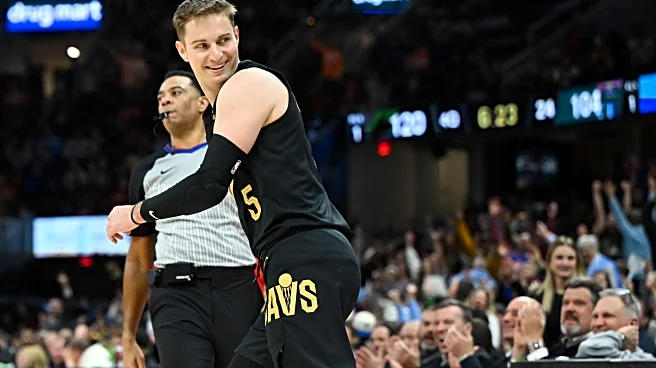What's Happening?
Arch Manning, the nephew of former No. 1 overall NFL draft picks Peyton and Eli Manning, is currently facing challenges as the starting quarterback for the Texas Longhorns. Despite a promising start as a dual-threat quarterback, Manning's performance has been inconsistent during the 2025 season, with Texas holding a 3-2 record in the SEC. His passing and running abilities have been affected by issues within the team's offensive line and receiving corps. Manning's current statistics include 1,151 passing yards, 11 touchdowns, and 5 interceptions, with a completion rate of 60%. Despite these struggles, Manning remains a top prospect for the NFL Draft, potentially entering between 2026 and 2028.
Why It's Important?
Arch Manning's draft prospects are significant due to his family's legacy and the expectations surrounding his career. His potential entry into the NFL could impact several teams looking for a franchise quarterback, including the Jets, Browns, Raiders, and Saints. Manning's decision to stay at Texas or enter the draft will influence the quarterback market and team strategies. His performance and development are closely watched, as he could become a pivotal figure in the NFL, similar to his uncles. The decision to enter the draft or continue his college career will also be influenced by the evolving landscape of Name, Image, and Likeness (NIL) deals, which provide financial incentives for college athletes.
What's Next?
Manning's future decisions will be crucial for both his career and the teams interested in drafting him. If he chooses to enter the NFL Draft in 2026, teams like the Jets, Browns, Raiders, and Saints may compete for his selection. Alternatively, Manning might opt to stay at Texas to further develop his skills, potentially entering the draft in 2027. His performance in the remaining college games will be critical in determining his draft stock. Additionally, the performance of other quarterback prospects could influence Manning's position as a top pick.
Beyond the Headlines
The situation surrounding Arch Manning highlights the broader implications of college athletes navigating their careers amidst NIL opportunities and family legacies. Manning's decision-making process reflects the balance between immediate professional opportunities and long-term career development. The evolving dynamics of college football, with increased financial incentives, may lead to more athletes considering extended college careers before entering professional leagues.











